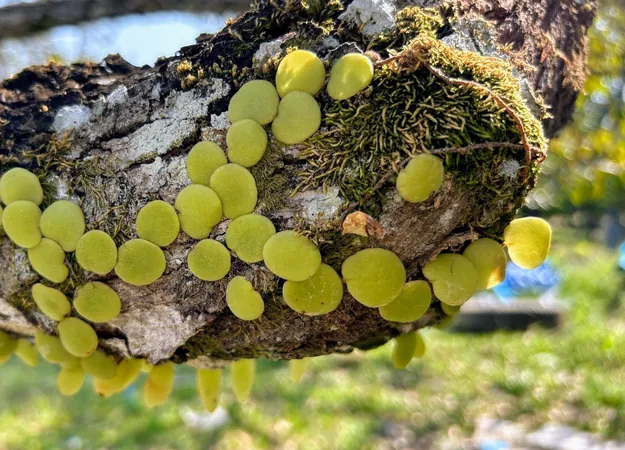
Can Parasitic Weeds Be Tricked into Oblivion? New Research Offers Hope!
2025-03-23
Author: Nur
For centuries, farmers have faced numerous challenges in keeping their crops safe from threats like drought, pests, and poor soil quality. However, one of the most insidious enemies has been the rise of parasitic weeds, which can wreak havoc on food supplies around the globe.
The Silent Culprit: Parasitic Weeds
Parasitic weeds are a dire threat, particularly in sub-Saharan Africa and parts of Asia, where they attach themselves to staple crops like rice and sorghum. These invasive plants don’t just grow alongside their healthy counterparts; they infiltrate the crop's roots and plunder essential nutrients and moisture. For farmers relying on these crops to feed their families, the destruction caused by parasitic weeds can spell disaster, leading to lower yields and devastating food shortages.
Unfortunately, many farmers in these regions have limited access to powerful herbicides or advanced agricultural technologies, leaving them largely defenseless against this growing threat. However, researchers from the University of California, Riverside (UCR) may have discovered an innovative solution that could turn the tide against these crop-killing invaders.
A Revolutionary Discovery
At the core of this breakthrough is a unique class of plant hormones known as strigolactones. These hormones play a dual role; they not only regulate vital processes like growth and root development but also help plants communicate with beneficial fungi in the soil. However, parasitic weeds have evolved to exploit this very system. When they detect strigolactones exuded by host plants, they interpret it as an invitation to germinate and attack.
What if we could use this knowledge to trick the parasitic weeds into sprouting when there are no hosts available? Researchers believe this could lead to a novel method of controlling their population by effectively forcing them to germinate and subsequently die without a suitable host to attach to.
The Science Behind the Strategy
By releasing synthetic versions of strigolactones at inappropriate times, UCR scientists aim to trigger the weeds’ germination when they cannot find a host. As David Nelson, a plant biologist at UCR, puts it, “We’re flipping their own switch against them, essentially encouraging them to commit suicide.” This could revolutionize the management of parasitic weeds, specifically the notorious broomrape, which can produce thousands of seeds that remain dormant in soil for years.
The researchers are also utilizing advanced microbial engineering techniques to produce strigolactones outside of plant systems. By exploiting genetically modified bacteria and yeast, they have set up a "hormone factory" that allows them to study the synthesis of these hormones in detail. This might not only enhance our understanding of plant biology but also pave the way for affordable and effective herbicides for farmers in the future.
A Broader Perspective
While the immediate goal is to protect crops, the potential applications of this research extend beyond agriculture. Strigolactones may also possess anti-cancer and anti-viral properties, presenting a promising avenue for medical research. Additionally, the insights gained could offer solutions to other agricultural challenges, such as combating citrus greening disease, which has devastated crops in Florida.
A Future Without Food Insecurity?
The innovative approach being pursued by UCR researchers is not merely about controlling weeds; it is a sneak peek into how we might use nature's own designs to inform agricultural practices and enhance food security. As the world continues to grapple with climate change and food shortages, this research promises a vital lifeline for farmers and communities reliant on stable food supplies.
As the scientists conduct further experiments in real-world settings to refine their techniques, the optimism is palpable. If successful, their efforts could become a game-changer for farmers battling invasive parasites.
In conclusion, while parasitic weeds may currently pose a significant threat to global food supplies, the innovative strategies emerging from this research could help turn the tide in favor of farmers everywhere. As the battle between agriculture and invasive species continues, science may finally provide the upper hand.


 Brasil (PT)
Brasil (PT)
 Canada (EN)
Canada (EN)
 Chile (ES)
Chile (ES)
 Česko (CS)
Česko (CS)
 대한민국 (KO)
대한민국 (KO)
 España (ES)
España (ES)
 France (FR)
France (FR)
 Hong Kong (EN)
Hong Kong (EN)
 Italia (IT)
Italia (IT)
 日本 (JA)
日本 (JA)
 Magyarország (HU)
Magyarország (HU)
 Norge (NO)
Norge (NO)
 Polska (PL)
Polska (PL)
 Schweiz (DE)
Schweiz (DE)
 Singapore (EN)
Singapore (EN)
 Sverige (SV)
Sverige (SV)
 Suomi (FI)
Suomi (FI)
 Türkiye (TR)
Türkiye (TR)
 الإمارات العربية المتحدة (AR)
الإمارات العربية المتحدة (AR)